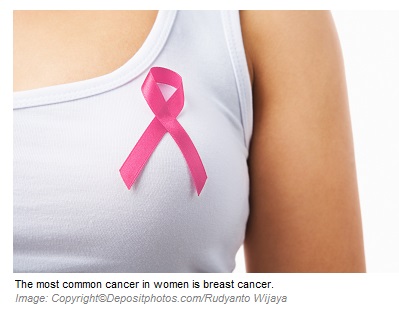Known as the most common cancer in women, breast cancer is a malignant growth of
 epithelial cells lining the ducts or lobules of the breast. Majority of people with breast cancer is discovered by a painless lump in the breast. Other signs and symptoms are: pain in breast, skin dimpling, changes in skin color or texture, clear or bloody discharge from breast, erosion, retraction of the nipple, redness and diffuse enlargement of breast, enlargement of lymph nodes in the armpit, and mammographic changes.
epithelial cells lining the ducts or lobules of the breast. Majority of people with breast cancer is discovered by a painless lump in the breast. Other signs and symptoms are: pain in breast, skin dimpling, changes in skin color or texture, clear or bloody discharge from breast, erosion, retraction of the nipple, redness and diffuse enlargement of breast, enlargement of lymph nodes in the armpit, and mammographic changes.
Breast cancer is very rare in men, and the female-to-male ratio is 150 to 1.
Potential risk factors and causative agents are:
- Early menarche (first menstruation before age 12 years old).
- Late menopause (menopause after age 52 years old).
- First full term pregnancy after age 35 years old.
- Nulliparous women (those who have never given birth a baby).
- Genetics.
- Age.
- Race (more common in white women than among black).
- Hormone replacement therapy.
- Alcohol.
- Smoking.
- Environmental factors: exposure to herbicides, pesticides, power lines, and radiation.
- Lack of exercise.
- Obesity.
- Nutritional factors:
- Low fiber diet.
- Diet high in saturated fats.
- Decreased intake of antioxidants.
- Insufficient intake of Omega-3.
- Increased calorie intake.
Nutritional Supports:
Restricted Foods:
- Refined sugars and sweets.
- Saturated fats.
- Trans-fats.
- Fried foods.
- Processed foods.
- Alcohol.
- Food additives and preservatives.
- Dairy products.
Recommended Foods:
- Drink plenty of water: at least 2 liters a day.
- Whole grains.
- Foods high in fiber: lentils, beans, avocado and artichoke.
- Foods high in Omega-3: fish, flaxseed, hemp seed, chia seed, and walnuts.
- Fresh vegetables.
- Vegetables high in Indole-3-carbinol: broccoli, cabbage, cauliflower, Brussels sprouts, kale and collard greens. Indole-3-carbinole may reduce risk of developing estrogen-related breast cancer by altering the metabolism of estrogen.
- Foods high in flavonoids: berries and red grapes.
- Foods high in phytoestrogens:
- High in lignans: flaxseed (the highest amount), sesame seeds, sunflower seeds, nuts (pistachios, almonds, walnuts, cashews and hazelnuts), oatmeal, rye, barley, wheat, legumes (lentils, navy beans, kidney beans, pinto and fava beans), soybean, alfalfa sprouts, cabbage, asparagus, green pepper, broccoli, cucumber, apricots, strawberries, peaches, raspberries, and dried prunes.
- High in coumestans:alfalfa sprouts, lima beans, pinto beans, and split peas.
- High in isoflavones: soybeans, soy products (tofu, tempeh, and miso), alfalfa sprouts, green beans, chick peas, and peanuts.
- Garlic.
- Basil.
- Foods high in folic acid: green leafy vegetables.
- Maitake mushroom.
- Ginger.
- Turmeric.
- Sumac.
- Green tea.
- Chamomile tea.
Recommended Supplements:
- Folic Acid: 1000 mcg. Folic acid reduces the risk of breast cancer in women who consume alcohol.
- Co-Enzyme Q 10: 300 – 600 mg a day. It is a powerful antioxidant that has a protective effect on breast cancer. To enhance absorption, it should be taken with meals.
- Omega – 3 Fatty acids: 3 – 10 grams a day.
- French Maritime Pine Bark Extract: 200 – 300 mg a day. It is a potent antioxidant that has an immune-enhancing effect.
- Grape Seed Extract: 50 – 100 mg a day.
- Indole – 3 – Carbinol: 300 – 600 mg a day. It alters metabolism of estrogen.
- D – Glucarate: 500 – 1000 mg a day. This product helps the liver detoxify and excrete excess hormones by blocking the enzyme B-glucuronidase.
- DIM (Di Indole Methane): 100 – 200 mg a day. It assists the liver in estrogen breakdown.
- Melatonin: 6 – 18 mg a day. Melatonin has an anticancer activity against breast cancer especially in those who have night shift works.
- Vitamin D: 2000 – 5000 IU a day.
- Curcumin: 1000 – 1500 mg a day. It has detoxifying, anti-inflammatory and anti-cancer activities.
- Resveratrol: 200 – 400 mg a day. It is a powerful antioxidant with an anti-cancer activity.
- Aloe Vera Juice (containing no aloin): ¼ to ½ cup three times a day.
- Chrysin: 500 – 1000 mg a day. This is a flavone that may lower estrogen level by inhibiting aromatase enzyme.
- Maitake mushroom: 600 – 1200 mg a day or Maitake D-Fraction: 6 to 12 drops of liquid per day. The active ingredient in maitake mushroom is beta-D-glucan and has shown promising results against cancers especially breast and prostate cancers.
- Spirulina: as a tablet: 2000 – 3000 mg a day, or as a powder: 2 – 3 teaspoons a day. Spirulina has anti-cancer, detoxifying, immune-boosting and alkalinizing properties
- Digestive Enzymes: A full spectrum product.
- Probiotics: a product that provides minimum 15 to 20 billion organisms per serving.
- Multivitamin – Multiminerals: A high potency product.
Miscellaneous Suggestions:
- Liver detoxification.
- Colon cleansing.
- Ketogenic diet.
- Exercise.

